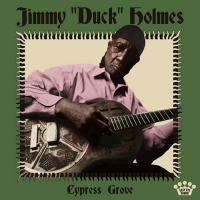Home » Jazz Articles » Album Review » Jimmy "Duck" Holmes: Cypress Grove
Jimmy "Duck" Holmes: Cypress Grove
The second artist in this program is Dan Auerbach, guitarist for the Black Keys and producer and performer on Cypress Grove ( which is released on the Black Keys' label Easy Eye). What Auerbach produces is a 21st century version of Chess Records' London Sessions series or John Lee Hooker's Endless Boogie (ABC, 1971) or Hooker 'n' Heat (Liberty, 1971) where an astute producer with his ear to the ground pairs older blues artists with younger, mostly white performers to revisit the old songbook. Auerbach comes sliding in on the success of the Black Keys, sporting enough momentum to update the old formula in a meaningful and enjoyable way.
After the introductory "Hard Times," Holmes and company get down to business, deliberately building a recording in which power and gravity evolves. The vibe Auerbach achieves is a vintage Excello sound: spare and raw, emotive, deep in the groove. Holmes plays in the single-chord, hypnotic fashion perfected by Hooker in the 1950s. The recording is programmed so that each successive song adds a new musical element. The solo acoustic "Hard Times" gives way to the electric and percussive "Cypress Grove," which, in turn, gives way to a more elaborate arrangement featuring Auerbach's muscular guitar playing on "Catfish Blues." Guitarist Marcus King adds a crying slide guitar to "Rock Me Baby" and "All NIght Long" while Leon Michaels infuses "Little Red Rooster" with an eerie tenor saxophone recalling the narcotic tones of UB40. The performances are fashioned as fragments with abrupt, jagged endings, like fractured thoughts, that recall the earliest blues recordings.
Cypress Grove is an honorable blues statement from Holmes, acknowledging the good intentions of Auerbach. It is enjoyable and educating at the same time: the type of recorded vehicle to bring the blues to a whole new generation.
Track Listing
Hard Times; Cypress Grove; Catfish Blues; Goin’ Away Baby; Rock Me Baby; Little Red Rooster; Devil Got My Woman; All Night Long; Gonna Get Old One Day; Train, Train; Two Women.
Personnel
Jimmy "Duck" Holmes
guitarJimmy Duck Holmes: guitar and vocals; Dan Auerbach: guitar; Eric Deaton: bass; Sam Bacco: drums and percussion; Marcus King: guitar (5, 8); Leon Michaels: tenor saxophone.
Album information
Title: Cypress Grove | Year Released: 2019 | Record Label: Easy Eye Sounds
< Previous
Dreamlife of Debris
Next >
Gunn's Ablazin'
Comments
About Jimmy "Duck" Holmes
Instrument: Guitar
Related Articles | Concerts | Albums | Photos | Similar ToTags
For the Love of Jazz
 All About Jazz has been a pillar of jazz since 1995, championing it as an art form and, more importantly, supporting the musicians who create it. Our enduring commitment has made "AAJ" one of the most culturally important websites of its kind, read by hundreds of thousands of fans, musicians and industry figures every month.
All About Jazz has been a pillar of jazz since 1995, championing it as an art form and, more importantly, supporting the musicians who create it. Our enduring commitment has made "AAJ" one of the most culturally important websites of its kind, read by hundreds of thousands of fans, musicians and industry figures every month.




















